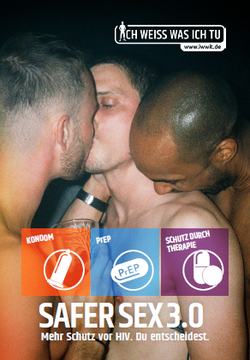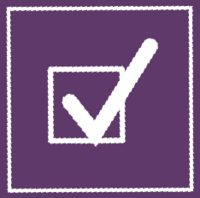Protection
Protection against HIV

Each of the following three methods (Safer Sex 3.0) protects against HIV if applied correctly:
- Condoms prevent HIV from getting into the body or onto mucous membranes during sex.
- Protection through therapy: HIV medication suppresses the multiplication of the virus inside the body of an HIV-positive person so that HIV cannot be transmitted during sex.
- PrEP (pre-exposure prophylaxis): Here, HIV-negative people take HIV medication that protects them against infection during sex. Correct use is important for the effectiveness of PrEP. The addresses of the medical practices that prescribe PrEP in Saarland can be found here.
The links will take you to the pages of our umbrella organization and provide you up-to-date information.
You decide which safer sex method (currently) suits you best. You don't have to decide once and for all, but can decide depending on your situation and stage of life. You can also use several methods.
OUR TIP: Of course you can get advice from us on the individual topics by phone on 0681 - 19 4 11 or in person. You can find the telephone consultation times here. You can make an appointment for a personal consultation by phone or e-mail.
Especially for gay men, the German Aidshilfe offers a live chat. There, gay consultants answer your questions. Our street worker Achim is also part of the consultant team. You can reach the live chat at www.health-support.de.
Protection against other sexually transmitted infections

Most people get infected by an STI at some point. These are mainly transmitted during vaginal, anal and oral sex, but also during other practices, such as sharing sex toys. STIs can generally be treated well. If left untreated, they can have serious health consequences.
- Condoms reduce the risk of infection, but do not provide complete protection.
- You can be vaccinated against some STIs.
- Anyone who is sexually active and has changing partners should therefore be tested for STIs regularly.
Doxy-PEP/PrEP:
There is a very controversial discussion about the use of the antibiotic doxycycline to reduce the risk of infection by syphilis or chlamydia.
One argument in favor of taking it is that its effectiveness has been proven, at least in MSM (men who have sex with men) and trans* women who are taking HIV-PrEP or living with a known HIV infection.
The risk of developing resistance and possible damage to the microbiome inside the intestines are discussed as contra-arguments alongside interactions with other medications. In addition, doxycycline is not yet approved for being used as protection against syphilis and chlamydia. It is therefore an off-label prescription. There is also no protective effect against gonococci (the pathogen that causes gonorrhea). In Germany, only less than 10 % of gonococci are currently sensitive to doxycycline.
According to the German STI Society (DSTIG), its use as post-exposure prophylaxis (“Doxy-PEP”, i.e. a single oral dose of doxycycline 200mg within 24 hours after sex) can be considered in individual cases for a certain group of people, e.g. MSM with 10 or more sexual during the last 6 months who have had several bacterial infections during this time. However, the DSTIG is against the daily use of doxycycline (“Doxy-PrEP”) as a form of antibiotic STI prophylaxis.
In any case, it is advisable to obtain detailed information about the pros and cons in advance. We will be happy to help you with this.
OUR TIPS: Take advantage of our free test offer “Test it!” (see Testing). In addition to HIV, we can also test you for syphilis, chlamydia, gonococcus (gonorrhea) and hepatitis B and C. You can find the test dates here.
Of course, you can also get advice from us by phone on 0681 - 19 4 11 or in person. You can find the telephone consultation times here. You can make an appointment for a personal consultation with us by phone or email.